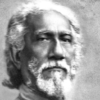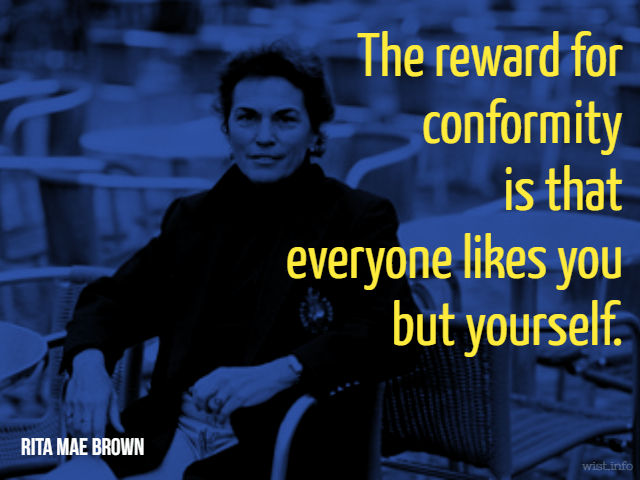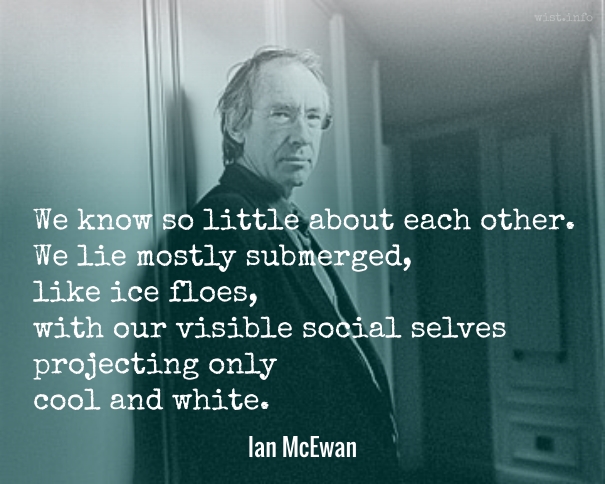All is not gold that glisters.
George Herbert (1593-1633) Welsh priest, orator, poet.
Jacula Prudentum, or Outlandish Proverbs, Sentences, &c. (compiler), # 306 (1640 ed.)
(Source)
Quotations about:
facade
Note not all quotations have been tagged, so Search may find additional quotes on this topic.
In great actions men show themselves as they ought to be, in small actions as they are.
[Dans les grandes choses, les hommes se montrent comme il leur convient de se montrer; dans les petites, ils se montrent comme ils sont.]
Nicolas Chamfort (1741-1794) French writer, epigrammist (b. Nicolas-Sébastien Roch)
Products of Perfected Civilization [Produits de la Civilisation Perfectionée], Part 1 “Maxims and Thoughts [Maximes et Pensées],” ch. 1, ¶ 52 (1795) [tr. Hutchinson (1902), “The Cynic’s Breviary”]
(Source)
(Source (French)). Alternate translations:
In great matters men show themselves as they ought; in little, as they are.
[tr. Mathers (1926)]
In affairs of importance, men show themselves at their best advantage; in small matters they are seen as they are.
[tr. Merwin (1969)]
In great things, men show themselves as they want to be seen; and in little ones they show themselves as they are.
[tr. Siniscalchi (1994)]
In important matters, men display themselves as they want to be seen; in minor matters as they really are.
[tr. Parmée (2003), ¶45]
The great majority of us are required to live a life of constant, systematic duplicity. Your health is bound to be affected if, day after day, you say the opposite of what you feel, if you grovel before what you dislike and rejoice at what brings you nothing but misfortune. Your nervous system isn’t a fiction, it’s a part of your physical body, and your soul exists in space and is inside you, like the teeth in your head. You can’t keep violating it with impunity.
Boris Pasternak (1890-1960) Russian poet, novelist, and literary translator
Doctor Zhivago [До́ктор Жива́го], Part 2, ch. 15 “Conclusion,” sec. 6 [Yury] (1955) [tr. Hayward & Harari (1958), UK ed.]
(Source)
Alternate translations:
The great majority of us are required to live a life of constant, systematic duplicity. Your health is bound to be affected if, day after day, you say the opposite of what you feel, if you grovel before what you dislike and rejoice at what brings you nothing but misfortune. Our nervous system isn’t just a fiction, it’s a part of our physical body, and our soul exists in space and is inside us, like the teeth in our mouth. It can’t be forever violated with impunity.
[tr. Hayward & Harari (1958), US ed.]
A constant, systematic dissembling is required of the vast majority of us. It’s impossible, without its affecting your health, to show yourself day after day contrary to what you feel, to lay yourself out for what you don’t love, to rejoice over what brings you misfortune. Our nervous system is not an empty sound, not a fiction. It’s a physical body made up of fibers. Our soul takes up room in space and sits inside us like the teeth in our mouth. It cannot be endlessly violated with impunity.
[tr. Pevear & Volokhonsky (2010)]
There is something laughable about the sight of authors who enjoy the rustling folds of long and involved sentences: they are trying to cover up their feet.
[Man hat Etwas zum Lachen, diese Schriftsteller zu sehen, welche die faltigen Gewänder der Periode um sich rauschen machen: sie wollen so ihre Füsse verdecken.]
Friedrich Nietzsche (1844-1900) German philosopher and poet
The Gay Science [Die fröhliche Wissenschaft], Book 4, § 282 (1882) [tr. Kaufmann (1974)]
(Source)
Also known as La Gaya Scienza, The Joyful Wisdom, or The Joyous Science.
(Source (German)). Alternate translations:
It is something laughable to see those writers who make the folding robes of their periods rustle around them: they want to cover their feet.
[tr. Common (1911)]
There is something laughable about those writers who make the folded drapery of their period rustle around them; they want to hide their feet.
[tr. Hill (2018)]
To discern faults, though they be in fashion: Though Vice be clothed in cloth of gold, yet a good man will still know it. It is to no purpose for it to be apparelled in gold, it can never so well disguise it self but that it will be perceived to be of iron. It would cloak it self with the nobility of its Adherents, but it is never stript of its baseness, nor the misery of its slavery.
[Conocer los defectos, por más autorizados que estén. No desconozca la entereza el vicio, aunque se revista de brocado; corónase tal vez de oro, pero no por eso puede disimular el yerro. No pierde la esclavitud de su vileza aunque se desmienta con la nobleza del sujeto.]
Baltasar Gracián y Morales (1601-1658) Spanish Jesuit priest, writer, philosopher
The Art of Worldly Wisdom [Oráculo Manual y Arte de Prudencia], § 186 (1647) [Flesher ed. (1685)]
(Source)
(Source (Spanish)). Alternate translations:
Recognise Faults, however high placed. Integrity cannot mistake vice even when clothed in brocade or perchance crowned with gold, but will not be able to hide its character for all that. Slavery does not lose its vileness, however it vaunt the nobility of its lord and master.
[tr. Jacobs (1892)]
Know what is evil, however much worshiped it may be. Let the man of intelligence not fail to recognize it, even if clothed in brocade, or crowned with gold, because it cannot thereby hide its bane, -- slavery does not lose its infamy, however noble the master.
[tr. Fischer (1937)]
Know when something is a defect, even if it looks like the opposite. Honesty should be able to recognize vice even when it dresses in brocade. Sometimes it wears a crown of gold, but even then it cannot hide its iron. Slavery is just as vile when disguised by high position.
[tr. Maurer (1992)]
Our virtues are usually only vices in disguise.
[Nos vertus ne sont le plus souvent que des vices déguisés]
François VI, duc de La Rochefoucauld (1613-1680) French epigrammatist, memoirist, noble
Réflexions ou sentences et maximes morales [Reflections; or Sentences and Moral Maxims], Epigraph (1675 ed.) [tr. Tancock (1959)]
(Source)
Added as an epigraph to the entire work in the 4th (1675) edition. A common theme in La Rochefoucauld's work, and variations of this maxim (and related thoughts) had been in the preceding editions and even this and later (see also ¶442).
(Source (French)). Alternate translations:
Our Vertues are oftentimes in Reality no better than Vices disguised.
[tr. Stanhope (1694)]
Our virtues are most frequently but vices disguised.
[tr. Bund/Friswell (1871)]
Our virtues are mostly but vices in disguise.
[tr. FitzGibbon (1957)]
Our virtues, most often, are only vices disguised.
[tr. Whichello (2016)]
As favour and riches forsake a man, we discover in him the foolishness they concealed, and which no one perceived before.
[À mesure que la faveur et les grands biens se retirent d’un homme, ils laissent voir en lui le ridicule qu’ils couvraient, et qui y était sans que personne s’en aperçût.]Jean de La Bruyère (1645-1696) French essayist, moralist
The Characters [Les Caractères], ch. 6 “Of Gifts of Fortune [Des Biens de Fortune],” § 4 (6.4) (1688) [tr. Van Laun (1885)]
(Source)
(Source (French)). Alternate translations:
When Riches and Favour forsake a Man, we see presently he was a Fool, but no body could find it out in his Prosperity.
[Bullord ed. (1696)]
In proportion as Riches and Favour forsake a Man, we discover he was a Fool, which no body cou'd find out in his Prosperity.
[Curll ed. (1713)]
As Riches and Favour forsake a Man, we discover him to be a Fool, but no body could find it out in his Prosperity.
[Browne ed. (1752)]
As a man falls out of favour and his wealth declines, we discover for the first time the ridiculous aspects of his character, which were always there but which wealth and favour had concealed.
[tr. Stewart (1970)]
If you are foolish enough to be contented, don’t show it, but grumble with the rest; and if you can do with a little, ask for a great deal. Because if you don’t you won’t get any.
Jerome K. Jerome (1859-1927) English writer, humorist [Jerome Klapka Jerome]
Idle Thoughts of an Idle Fellow, “On Getting On in the World” (1886)
(Source)
There are few people whom I really love, and still fewer of whom I think well. The more I see of the world, the more am I dissatisfied with it; and every day confirms my belief of the inconsistency of all human characters, and of the little dependence that can be placed on the appearance of merit or sense.
There was a time when all these things would have passed me by, like the flitting figures of a theatre, sufficient for the amusement of an hour. But now, I have lost the power of looking merely on the surface. Everything seems to me to come from the Infinite, to be filled with the Infinite, to be tending toward the Infinite. Do I see crowds of men hastening to extinguish a fire? I see not merely uncouth garbs, and fantastic, flickering lights, of lurid hue, like a trampling troop of gnomes — but straightway my mind is filled with thoughts about mutual helpfulness, human sympathy, the common bond of brotherhood, and the mysteriously deep foundations on which society rests; or rather, on which it now reels and totters.
Lydia Maria Child (1802-1880) American abolitionist, activist, journalist, suffragist
Letters from New-York, # 1, 1841-08-19 (1843)
(Source)
She weeps not for her sire if none be near,
In company she calls up many a tear.
True mourners would not have their sorrows known,
For grief of heart will choose to weep alone.[Amissum non flet cum sola est Gellia patrem,
Si quis adest, iussae prosiliunt lacrimae.
Non luget quisquis laudari, Gellia, quaerit,
Ille dolet vere, qui sine teste dolet.]Martial (AD c.39-c.103) Spanish Roman poet, satirist, epigrammatist [Marcus Valerius Martialis]
Epigrams [Epigrammata], Book 1, epigram 33 (1.33) (AD 85-86) [tr. Pott & Wright (1921)]
(Source)
"On Gellia." (Source (Latin)). Alternate translations:
Gellia ne'er mourns her father's loss,
When no one's by to see,
but yet her soon commanded tears
Flow in society:
To weep for praise is but a feigned moan;
He grieves most truly, that does grieve alone.
[tr. Fletcher (1656)]
When all alone, your tears withstand;
In company, can floods command.
Who mourns for fashion, bids us mark;
Who mourns indeed, mourns in the dark.
[tr. Killigrew (1695)]
Gellia alone, alas! can never weep,
Though her fond father perish'd in the deep;
With company the tempest all appears
And beauteous Gellia's e'en dissolved in tears.
Through public grief though Gellia aims at praise,
'Tis private sorrow which must merit raise.
[Gentleman's Magazine (1736)]
Her father dead! -- Alone no grief she knows;
Th' obedient tear at every visit flows.
No mourner he, who must with praise be fee'd!
But he, who mourns in secret, mourns indeed.
[tr. Hay (1755), 1.34]
Sire-reft, alone, poor Gellia weeps no woe:
In company she bids the torrent flow.
they cannot grieve, who to be seen, can cry:
Theirs is the grief, who without witness sigh.
[tr. Elphinston (1782), Book 6, Part 3, ep. 1]
Gellia, when she is alone, does not lament the loss of her father. If any one be present, her bidden tears gush forth. A person does not grieve who seeks for praise; his is real sorrow who grieves without a witness.
[tr. Amos (1858), #95 "Feigned Tears"]
Gellia does not mourn for her deceased father, when she is alone; but if any one is present, obedient tears spring forth. He mourns not, Gellia, who seeks to be praised; he is the true mourner, who mourns without a witness.
[tr. Bohn's Classical (1859)]
He grieves not much who grieves to merit praise;
His grief is real who grieves in solitude.
[ed. Harbottle (1897)]
Gellia weeps not while she is alone for her lost father; is any one be present, her tears leap forth at her bidding. He does not lament who looks, Gellia for praise;' he truly sorrows who sorrows unseen.
[tr. Ker (1919)]
Gellia, alone, ne'er weeps her sire at all;
In company the bidden tears down fall.
True grief is not for admiration shown.
He only weeps indeed, who weeps alone.
[tr. Francis & Tatum (1924), #18, 1.32]
When alone, Gellia never cries for the father she lost.
If someone is with her, tears well up in her eyes,
as if ordered to fall in. If some one looks for praise,
he is not in mourning, Gellia.
He truly mourns
who mourns
alone.
[tr. Bovie (1970)]
In private she mourns not the late-lamented;
If someone's by her tears leap forth on call.
Sorry, my dear, is not so easily rented.
They are true tears that without witness fall.
[tr. Cunningham (1971)]
Gellia does not cry for her lost father when she's by herself, but if she has company, out spring the tears to order. Gellia, whoever seeks credit for mourning is no mourner. He truly grieves who grieves without witnesses.
[tr. Shackleton Bailey (1993)]
Gellia's mourning for her father?
If by herself she doesn't bother.
But when she sees that company lurks
She opens up the waterworks.
She just wants praise for grief that's shown;
They truly grieve who weep alone.
[tr. Ericsson (1995)]
When Janet is sequestered, out of view,
Then never for her father's death she cries.
But let some viewers come, just one or two,
Then tears dramatically flood her eyes.
We know from this how sad in fact she's been:
It is not grief that's only grieved when seen.
[tr. Wills (2007)]
Gellia doesn't weep for her dead father
when she's alone, but tears pour on command
if someone comes. Who courts praise isn't mourning --
he truly grieves who grieves with none at hand.
[tr. McLean (2014)]
Alone, Gellia never weeps over her father's death;
if someone's there, her tears burst forth at will.
Mourning that looks for praise, Gellia, is not grief:
true sorrow grieves unseen.
[tr. Powell]
The difference between narcissism and self-love is a matter of depth. Narcissus falls in love not with the self, but with an image or reflection of the self — with the persona, the mask. The narcissist sees himself through the eyes of another, changes his lifestyle to conform with what is admired by others, tailors his behavior and expression of feelings to what will please others. Narcissism is eye trouble, voluntary blindness, an agreement to keep up appearances (hence the importance of “style”) and not to look beneath the surface.
Sam Keen (b. 1931) American author, professor, philosopher
The Passionate Life, ch. 8 (1983)
(Source)
A man who parades his piety is one who, under an atheist king, would be an atheist.
[Un dévot est celui qui, sous un roi athée, serait athée.]
Jean de La Bruyère (1645-1696) French essayist, moralist
The Characters [Les Caractères], ch. 13 “Of the Fashion [De la Mode],” § 21 (13.21) (1688)
(Source)
La Bruyère notes in the original this refers to a "faux dévot."
(Source (French)). Alternate translations:
An Hypocrite is one that will be an Atheist under a King that is so.
[Bullord ed. (1696)]
A Devote is one, that under a King who was an Atheist, would be a Devote.
[Curll ed. (1713)]
A Devoto is one, that under an atheistical King wouild be an Atheist.
[Browne ed. (1752)]
A pious person is one who, under an atheistical king, would be an atheist.
[tr. Van Laun (1885)]
A pious hypocrite is one who, under an atheistic king, would be an atheist.
[tr. Stewart (1970)]
Good manners without sincerity are like a beautiful dead lady.
Sri Yukteswar Giri (1855-1936) Indian monk, yogi, guru [श्रीयुक्तेश्वर गिरि, b. Priya Nath Karar]
In Paramahansa Yogananda, Autobiography of a Yogi, ch. 12 (1946)
(Source)
We must realize that man’s nature will remain the same so long as he remains man; that civilization is but a slight coverlet beneath which the dominant beast sleeps lightly and ever ready to awake.
Politics: a Trojan horse race.
Stanislaw Lec (1909-1966) Polish aphorist, poet, satirist
More Unkempt Thoughts [Myśli nieuczesane nowe] (1964) [tr. Gałązka (1969)]
(Source)
Charming villains have always had a decided social advantage over well-meaning people who chew with their mouths open.
Judith Martin (b. 1938) American author, journalist, etiquette expert [a.k.a. Miss Manners]
Common Courtesy, “In the Quest for Equality, Civilization Itself Is Maligned” (1985)
(Source)
Originally published in The New Republic in 1984.
Many perform the foulest deeds and rehearse the fairest words.
[Πολλοὶ δρῶντες τὰ αἴσχιστα λόγους ἀρίστους ἀσκέουσιν.]
Democritus (c. 460 BC - c. 370 BC) Greek philosopher
Frag. 53a (Diels) [tr. Barnes (1987)]
(Source)
Diels citation "53a. (122 b N.) DEMOKRATES. 19.2. (Stob. II, 15, 33)" Bakewell lists this under "The Golden Sayings of Democritus." Freeman notes this as one of the Gnômae, from a collection called "Maxims of Democratês," but because Stobaeus quotes many of these as "Maxims of Democritus," they are generally attributed to the latter.
Alternate translations:
- "Many who do the basest deeds can make most learned speeches." [tr. Bakewell (1907)]
- "Many whose actions are most disgraceful practise the best utterances." [tr. Freeman (1948)].
- "Many who do the worst things prepare the best speeches." [@sentantiq (2020), fr. 54]
Few are those who wish to be endowed with virtue rather than to seem so.
[Virtute enim ipsa non tam multi praediti esse quam videri volunt.]
Marcus Tullius Cicero (106-43 BC) Roman orator, statesman, philosopher
Laelius De Amicitia [Laelius on Friendship], ch. 26 / sec. 98 (44 BC)
Common translation. Alternates:
- "For not so many desire to be endowed with virtue itself, as to seem to be so." [tr. Edmonds (1871)]
- "For there are not so many possessed of virtue as there are that desire to seem virtuous." [tr. Peabody (1887)]
- "For many wish not so much to be, as to seem to be, endowed with real virtue." [tr. Falconer (1923)]
Wit is cultured insolence.
[ἡ γὰρ εὐτραπελία πεπαιδευμένη ὕβρις ἐστίν.]
Aristotle (384-322 BC) Greek philosopher
Rhetoric [Ῥητορική; Ars Rhetorica], Book 2, ch. 12, sec. 16 (2.12.16) / 1389b.11 (350 BC) [tr. Freese (1926)]
(Source)
(Source (Greek)). Alternate translations:
I make this distinkshun between charakter and reputashun — reputashun iz what the world thinks ov us, charakter is what the world knows of us.
[I make this distinction between character and reputation — reputation is what the world thinks of us, character is what the world knows of us.]
Josh Billings (1818-1885) American humorist, aphorist [pseud. of Henry Wheeler Shaw]
Everybody’s Friend, Or; Josh Billing’s Encyclopedia and Proverbial Philosophy of Wit and Humor, “Lobstir Sallad” (1874)
(Source)
Judge nothing by the appearance. The more beautiful the serpent, the more fatal its sting.
William Scott Downey (fl. 19th C) American baptist missionary, aphorist
Proverbs, ch. 6, #8 (1853)
(Source)
The world oftener rewards the appearances of merit than merit itself.
François VI, duc de La Rochefoucauld (1613-1680) French epigrammatist, memoirist, noble
Réflexions ou sentences et maximes morales [Maxims], #312 (1665-1678)
(Source)
The surface of American society is, if I may use the expression, covered with a layer of democracy, from beneath which the old aristocratic colors sometimes peep.
Alexis de Tocqueville (1805-1859) French writer, diplomat, politician
Democracy in America, ch. 2 (1835) [tr. Reeve (1899)]
(Source)
Alt. trans.:
- As above, but given as "... sometimes seep."
- "American society, if I may put it this way, is like a painting that is democratic on the surface but from time to time allows the old acistocratic colors to peep through." [tr. Goldhammer (2004)]
- "The surface of American society is covered with a layer of democratic paint, but from time to time one can see the old aristocratic colors breaking through."
The reward for conformity was that everyone liked you but yourself.
Rita Mae Brown (b. 1944) American author, playwright
Venus Envy, ch. 15 (1993)
(Source)
Often paraphrased in the present tense: "The reward for conformity is that everyone likes you but yourself."
There are no grades of vanity, there are only grades of ability in concealing it.
Mark Twain (1835-1910) American writer [pseud. of Samuel Clemens]
Note (1898-07-04)), Mark Twain’s Notebook, ch. 21 “In Vienna” (1935) [ed. Albert Bigelow Paine]
(Source)
While summering in Kaltenleutgeben, Austria.
The only people who can still strike us as normal are those we don’t yet know very well.
Alain de Botton (b. 1969) Swiss-British author
The Course of Love, “Irreconcilable Desires” (2016)
(Source)
It had snowed in the night, and the world looked very clean, which I knew it not to be. But illusion is nice sometimes.
No man ever stood the lower in my estimation for having a patch in his clothes; yet I am sure that there is greater anxiety, commonly, to have fashionable, or at least clean and unpatched clothes, than to have a sound conscience.
She smoothed her hair back from her forehead and looked at herself in the mirror. She looked like she always looked. It was probably a truth about tragedy, she thought, while the tragedy is going on people look pretty much the way they looked when it wasn’t.
Every man has three characters — that which he exhibits, that which he has, and that which he thinks he has.
Alphonse Karr (1808-1890) French journalist and novelist
A Tour Round My Garden [Voyage autour de mon jardin] (1851)
(Source)
Great robbers always resemble honest folk. Fellows who have rascally faces have only one course to take, and that is to remain honest; otherwise, they would be arrested off-hand.
Jules Verne (1828-1905) French novelist, poet, playwright
Around the World in Eighty Days, ch. 6 (1873)
(Source)
A cheerful, easy countenance and behavior are very useful: they make fools think you a good-natured man, and they make designing men think you an undesigning one.
Since unhappiness excites interest, many, in order to render themselves interesting, feign unhappiness.
Joseph Roux (1834-1886) French Catholic priest
Meditations of a Parish Priest: Thoughts, ch. 5, #24 (1886)
(Source)
Many men and many women enjoy popular esteem, not because they are known, but because they are not.
Nicolas Chamfort (1741-1794) French writer, epigrammist (b. Nicolas-Sébastien Roch)
(Attributed)
(Source)
Attributed in Maturin M. Ballou, Notable Thoughts About Women, #3144 (1882).
I don’t mind hidden depths but I insist that there be a surface.
Be wiser than other people, if you can; but do not tell them so.
Lord Chesterfield (1694-1773) English statesman, wit [Philip Dormer Stanhope]
Letter to his son, #104 (29 Nov 1745)
(Source)
In short, we can judge by nothing but Appearances, and they are very apt to deceive us. Some put on a gay chearful Outside, and appear to the World perfectly at Ease, tho’ even then, some inward Sting, some secret Pain imbitters all their Joys, and makes the Balance even: Others appear continually dejected and full of Sorrow; but even Grief itself is sometimes pleasant, and Tears are not always without their Sweetness: Besides, Some take a Satisfaction in being thought unhappy, (as others take a Pride in being thought humble,) these will paint their Misfortunes to others in the strongest Colours, and leave no Means unus’d to make you think them thoroughly miserable; so great a Pleasure it is to them to be pitied; Others retain the Form and outside Shew of Sorrow, long after the Thing itself, with its Cause, is remov’d from the Mind; it is a Habit they have acquir’d and cannot leave.
Benjamin Franklin (1706-1790) American statesman, scientist, philosopher, aphorist
“A Dissertation on Liberty and Necessity” (1725)
(Source)
Virtue and learning, like gold, have their intrinsic value: but if they are not polished, they certainly lose a great deal of their lustre; and even polished brass will pass upon more people than rough gold.
Lord Chesterfield (1694-1773) English statesman, wit [Philip Dormer Stanhope]
Letter to his son, #118 (6 Mar 1747)
(Source)
Your beauty should not come from outward adornment, such as elaborate hairstyles and the wearing of gold jewelry or fine clothes. Rather, it should be that of your inner self, the unfading beauty of a gentle and quiet spirit, which is of great worth in God’s sight.
The Bible (The New Testament) (AD 1st - 2nd C) Christian sacred scripture
1 Peter 3:3-4 [NIV (2011 ed.)]
(Source)
Alternate translations:
Whose adorning let it not be that outward adorning of plaiting the hair, and of wearing of gold, or of putting on of apparel;
But let it be the hidden man of the heart, in that which is not corruptible, even the ornament of a meek and quiet spirit, which is in the sight of God of great price.
[KJV (1611)]
Do not dress up for show: doing up your hair, wearing gold bracelets and fine clothes; all this should be inside, in a person’s heart, imperishable: the ornament of a sweet and gentle disposition -- this is what is precious in the sight of God.
[JB (1966)]
You should not use outward aids to make yourselves beautiful, such as the way you fix your hair, or the jewelry you put on, or the dresses you wear. Instead, your beauty should consist of your true inner self, the ageless beauty of a gentle and quiet spirit, which is of the greatest value in God's sight.
[GNT (1976)]
Your adornment should be not an exterior one, consisting of braided hair or gold jewelry or fine clothing, but the interior disposition of the heart, consisting in the imperishable quality of a gentle and peaceful spirit, so precious in the sight of God.
[NJB (1985)]
Don’t try to make yourselves beautiful on the outside, with stylish hair or by wearing gold jewelry or fine clothes. Instead, make yourselves beautiful on the inside, in your hearts, with the enduring quality of a gentle, peaceful spirit. This type of beauty is very precious in God’s eyes.
[CEB (2011)]
Do not adorn yourselves outwardly by braiding your hair, and by wearing gold ornaments or fine clothing; rather, let your adornment be the inner self with the lasting beauty of a gentle and quiet spirit, which is very precious in God’s sight.
[NRSV (2021 ed.)]
Never believe in a meritocracy in which no one is funny-looking.
Teresa Nielsen Hayden (b. 1956) American editor, writer, essayist
Making Light, “Commonplaces”
(Source)
Whatever may be the success of my stories, I shall be resolute in preserving my incognito, having observed that a nom de plume secures all the advantages without the disagreeables of reputation.

























































